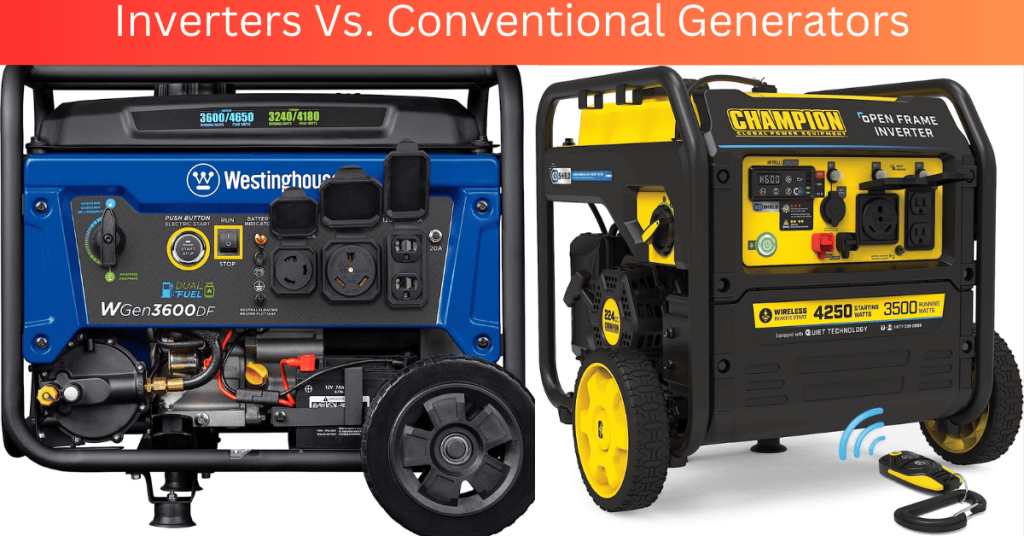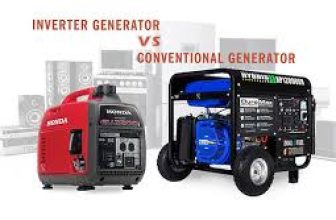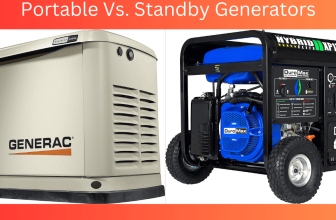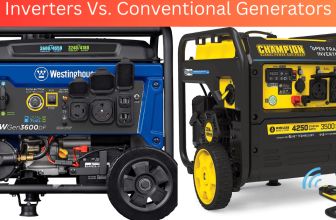Decoding The Debate: Inverter Generators Vs. Conventional Generators
Hey there, folks! If you’re trying to decide between an inverter generator and a conventional generator, you’re in the right place.
I’m here to decode the debate so you can make the right choice for your needs.
I know this is a big decision and that it might seem overwhelming at first. But don’t worry – I’m gonna break it down for you step-by-step so you can understand the differences between these two types of generators and make an informed choice.
So let’s get started!

Overview Of Generator Types
Generators come in all shapes and sizes, and the type you choose matters a lot. Two popular types are conventional generators and inverter generators. Which one is right for you? In this article, I’m going to provide an overview of each so you can make an informed decision.
Conventional generators come in many different power ranges. They are usually powered by gasoline or diesel fuel, but there are some propane models available as well. Conventional generators run at a consistent speed, making them less efficient than inverter generators. On the plus side, conventional generators tend to be more durable since they don’t have any electronics inside.
Inverter generators, on the other hand, use advanced electronics to regulate the speed of the engine. This helps them run more efficiently and quieter than conventional models. They also produce cleaner electricity which is safer for sensitive electronic devices like laptops and phones. The downside is that they’re usually more expensive than their conventional counterparts and they require more maintenance due to their complexity.
Now that you know a bit about generator types, let’s dive into the specifics of inverter generator basics.
Inverter Generator Basics
Let’s start with the basics of an inverter generator. If you’re new to the world of generators, this is a perfect place to start.
An inverter generator is a type of portable generator that produces clean power, also known as ‘pure sine wave’ or ‘modified sine wave. This means that it produces energy that’s safe for sensitive electronics like laptops and smartphones. They are typically more fuel efficient, quieter and lighter than conventional generators, making them ideal for camping trips or emergency home use.
Inverter generators are powered by small engines similar to those found in lawnmowers and other gas-powered tools. The engine runs at variable speeds depending on the load requirements, meaning they can run more efficiently than traditional generators which run at fixed speed regardless of how much electricity is used. This makes them quieter and more fuel-efficient since they only need to use as much power as needed to meet demand.
Inverter generators have some drawbacks too: their smaller size means they won’t be able to support large appliances such as air conditioners or refrigerators; their higher price tag makes them less affordable than conventional models; and their delicate electronics may require additional maintenance due to the sensitive nature of their components.
All things considered though, inverter generators offer several advantages over traditional models that make them worth considering if you’re looking for a reliable source of portable power.
Now that we’ve got the basics down, let’s take a look at the advantages of an inverter generator compared to a conventional one.
Advantages Of An Inverter Generator
When it comes to generators, inverter generators are becoming increasingly popular. Unlike conventional generators, inverter generators offer many advantages that make them the better choice for a variety of situations.
Firstly, inverter generators are much quieter than their traditional counterparts. This means that you won’t have to worry about annoying your neighbors or disturbing wildlife with loud motor noise.
Additionally, they are more fuel-efficient and produce cleaner power with fewer emissions. This makes them a great option if you’re looking to be more eco-friendly in your energy use.
Lastly, inverter generators are lighter and more compact than conventional models, making them easier to transport and store away when not in use.
These advantageous features of an inverter generator make it an ideal choice for those seeking a reliable power source in any situation. From camping trips to home renovation projects, an inverter generator will provide the clean and quiet power you need without having to lug around a bulky traditional model or cause unnecessary noise pollution.
Now that we’ve gone over the benefits of owning an inverter generator, let’s take a look at some of the drawbacks associated with this type of generator so you can decide if it’s right for you.
Disadvantages Of An Inverter Generator
I’ll start by talking about the disadvantages of an inverter generator.
The biggest issue is that they are more expensive than conventional generators, so you have to pay a premium to get one.
In addition, they’re also larger and heavier than their conventional counterparts, making them difficult to transport.
Finally, inverter generators have less power output than conventional generators, which means they may not be able to handle large loads like air conditioners or furnaces.
Inverter generators also have a few other drawbacks that are worth mentioning.
They can be noisy and create a lot of vibration when running, so they may not be suitable for camping trips or other times when noise levels need to be kept low.
Additionally, inverter generators require more maintenance than conventional models since the engine needs to run at higher speeds in order to produce AC power.
Overall, inverter generators offer some great benefits but should be carefully considered before buying due to their cost and potential drawbacks.
Understanding how these machines work will help you make an informed decision about whether an inverter generator is right for you.
With this knowledge in mind, let’s move on to looking at the basics of conventional generators.
Conventional Generator Basics
Having explored the disadvantages of an inverter generator, let’s now turn our attention to conventional generators.
A conventional generator is a type of generator that has been around for decades and is still popular today. It produces power through a combustion motor which runs on fuel such as gasoline or diesel.
This type of generator is usually much louder than an inverter generator, but it does have some advantages too. One notable advantage is that it can generate more power than an inverter generator, making it great for powering multiple devices or appliances at once.
Conventional generators are also often cheaper to purchase and may be easier to find in stores compared to inverter generators. Another benefit of a conventional generator is that they often come with accessories like wheels, handles, and cords for easy transport and usage.
While conventional generators don’t offer the same level of portability and quiet operations as inverter models, they can still be useful in a variety of scenarios where you need more power or don’t have access to other sources of electricity.
With that in mind, let’s take a look at the advantages of a conventional generator as we transition into the next section.
Advantages Of A Conventional Generator
I’m sure we all want to figure out which type of generator is better for our needs. Inverter generators and conventional generators both offer their own advantages and disadvantages. Let’s take a look at the benefits of using a conventional generator.
First, conventional generators are more affordable than inverter generators, so they’re great for those who are on a budget. They also tend to be more powerful than inverter models, producing higher wattages for larger jobs. Plus, when it comes to maintenance and repairs, parts for these units are widely available and typically cheaper than parts needed to repair inverter models.
Conventional generators are also easy to use and reliable whenever you need them. Because they don’t use complex electrical components like inverter units do, they can generally last longer and require less maintenance over time. Even if something does go wrong with one of these models, it’s usually much simpler to diagnose and fix the problem yourself compared to an inverter unit.
As you can see, there are several advantages associated with using a conventional generator that make them worth considering if you’re in the market for this type of power source. Now let’s take a look at some of the downsides of these models so that we can get a better understanding of what kind of unit is best for us.
Disadvantages Of A Conventional Generator
Using a conventional generator can be quite inconvenient, especially when compared to an inverter generator.
For starters, they are much heavier than their inverter counterparts and require more space. You’ll need to dedicate a large enough area for it to be safely operated. This makes them difficult to transport, as they aren’t always easy to move around.
Plus, they require more maintenance than inverter generators – regular oil changes and fuel filter replacements are needed in order to keep them running smoothly. Conventional generators also tend to be less efficient than inverter models.
They produce more waste carbon dioxide emissions due to their lower efficiency. The noise levels produced by these units are also significantly higher than those of inverters – some can reach decibel levels that are uncomfortable for humans and animals alike.
With the additional noise pollution comes added stress on those who must endure it on a regular basis, making this a disadvantage when compared with quieter inverter models. Finally, conventional generators are usually cheaper up-front but cost more in the long run due to their greater maintenance requirements and lower efficiency.
When looking at the bigger picture, an inverter generator is often the wiser choice for its overall performance – not only in terms of power output but also in terms of noise production and overall savings over time. With this in mind, let’s compare the two types of generators based on their noise levels…
Comparing Noise Levels
When it comes to noise levels, inverter generators and conventional generators differ significantly. Conventional generators are typically louder and more disruptive than inverter generators. This is because they use a traditional engine to generate electricity, which creates a lot of noise.
On the other hand, inverter generators are much quieter as they use an advanced technology that produces clean power with very little vibration or sound. Inverter generators are especially appreciated by homeowners and campers who want to enjoy some peace and quiet while they run their device. They also do not require any special maintenance like conventional generators do, which makes them even more convenient for those who don’t have time to take care of them regularly.
The difference in noise levels between inverter and conventional generators is quite striking, making the former an ideal choice for those who value peace and quiet in their living or camping spaces. With this in mind, let’s move on to comparing fuel efficiency between these two types of generator.
Comparing Fuel Efficiency
When it comes to fuel efficiency, inverter generators have a clear edge. These models are designed to be ultra-efficient and can go much longer on the same amount of fuel than conventional generators. This means that you’ll spend less money on refueling and won’t have to worry about running out of gas in the middle of a job. Plus, their smaller size and lighter weight make them easier to transport and use in places where conventional generators simply won’t fit.
Inverter generators also tend to produce cleaner power than conventional models. This makes them ideal for powering sensitive electronics like computers, smartphones, televisions, and other appliances without worrying about power spikes or surges that could damage your devices. And because they don’t produce as much noise as regular generators, you won’t disturb your neighbors when using one.
Given these benefits, it’s no wonder that inverter generators are becoming increasingly popular with homeowners and businesses alike. They offer a convenient solution for powering small jobs or tackling larger projects – all while saving you time and money in the long run.
With these advantages in mind, let’s move on to the final verdict: which generator is right for you?
Final Verdict: Which Generator Is Right For You?
When it comes to choosing between an inverter generator and a conventional generator, there’s no one-size-fits-all answer. It really depends on the type of power you need and the environment in which you’ll be using the generator.
Inverter generators are typically more expensive than conventional generators, but they’re also quieter and more fuel efficient. Plus, their output is more stable and consistent than that of a conventional generator, making them ideal for powering sensitive electronics like computers, laptops, and TVs.
On the other hand, if you’re just looking for basic power supply for tools or lights around your home or campsite, then a conventional generator may be all you need.
So when considering inverter generators vs. conventional generators, think about what type of power you require and how often you’ll use your generator. With this information in hand, you can make an informed decision on which type of generator is right for your needs.
Frequently Asked Questions
How Much Does An Inverter And Conventional Generator Cost?
When it comes to cost, you’ll find that an inverter generator typically costs more than a conventional one.
Inverter generators can range in price from $500-$5,000 depending on the size and features you choose, while conventional generators are usually less expensive and range from $200-$1,000.
So if you’re looking for a cheaper option, then a conventional generator might be the right choice for you.
How Difficult Is It To Use And Maintain An Inverter Or Conventional Generator?
Using and maintaining an inverter or conventional generator isn’t all that difficult. With a little bit of knowledge, you can easily figure out which one to use and how to maintain it.
Inverter generators are typically easier to use since they feature push-button start and their operation is computerized. On the other hand, conventional generators are more manual in nature and require more effort when it comes to maintenance.
But with some basic know-how, you can get either one up and running without much fuss.
What Safety Precautions Should Be Taken When Using An Inverter Or Conventional Generator?
When using an inverter or conventional generator, safety should be a top priority. Make sure to read the user manual to understand how to use it safely and correctly.
Always wear protective clothing, such as gloves and safety glasses, when using either type of generator. Keep children away from the generator when in use and make sure that cords are not pulled or stretched too tightly.
Additionally, be aware of exhaust fumes and ensure that the area is well ventilated. Finally, never operate your generator in wet weather – this can cause electric shock or even fire!
Taking these precautions will ensure you have a safe experience with your inverter or conventional generator.
What Is The Average Lifespan Of An Inverter And Conventional Generator?
When it comes to generators, the types of units you can choose from and their respective lifespans are important considerations.
Inverter generators typically have an average lifespan of around 4,000 hours, while conventional generators have an average lifespan of around 3,500 hours.
That said, these numbers can vary greatly depending on a variety of factors such as how well you maintain your generator and the type of fuel you’re using.
Are Inverter And Conventional Generators Suitable For Use In Populated Areas?
When it comes to using a generator in populated areas, the best choice is an inverter generator. Inverter generators are more efficient and quieter than conventional generators – two important factors when living near other people.
The inverter’s portability also makes it an appealing choice for residential areas, as you can easily move it around when needed. However, you’ll want to keep in mind that inverters usually have a shorter life span than conventional generators.
So make sure you’re prepared to replace it sooner rather than later if you decide to go with an inverter!
Conclusion
In conclusion, the decision between an inverter generator and a conventional generator can be difficult to make. It is important to consider factors such as cost, upkeep, safety and noise levels when making the decision.
Inverter generators are generally more expensive than conventional generators but they offer quieter operation and are safer for use in populated areas.
On the other hand, conventional generators tend to last longer and require less maintenance.http://Westinghouse Outdoor Power Equipment 4500 Peak Watt Super Quiet Portable Inverter Generator, Remote Electric Start with Auto Choke, Wheel & Handle Kit, RV Ready, Gas Powered, Parallel Capable
Ultimately, it depends on your needs and situation which type of generator you should choose.
I suggest doing further research before settling on a generator that fits your needs.





